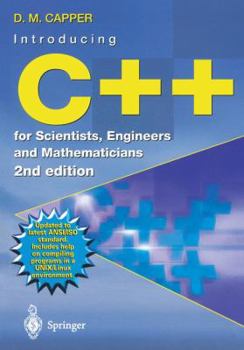Introducing C++ for Scientists, Engineers and Mathematicians
Since the first edition of C++ for Scientists, Engineers and Mathematicians, many things have changed. Perhaps the most important is that the ANSI C++ Standard was approved in 1998. The first edition of this book was incompatible with some parts of the Standard and every effort has been made to rectify this. The facilities offered by the C++ language have also grown enormously since the first edition. It is not just the language itself that has grown, but the ANSI Standard also defines an extensive range of library facilities. I have also made two changes in emphasis since the first edition. Firstly, since there is so much important material to cover, some less important features of the language have been removed. The second change is to try to illustrate the language by means of complete programs, rather than code fragments. Hopefully, this will give you more confidence in applying new techniques. Finally, although C++ is a bigger language than it was, it is even more fun to use.
Format:Paperback
Language:English
ISBN:1852334886
ISBN13:9781852334888
Release Date:September 2001
Publisher:Springer
Length:544 Pages
Weight:2.10 lbs.
Dimensions:1.3" x 6.6" x 9.8"
Customer Reviews
5 ratings
A Pleasure for Numerical Applications!
Published by Thriftbooks.com User , 17 years ago
This book is fantastic for learning C++ using numerical-analytic examples. It is not exactly an easy introduction to the C++ language, which is admittedly vast and profound. Especially someone with little or no programming background would be rather disappointed with it. I recommend coming to it after doing a first course in C++ itself using something like Deitel & Deitel (C++ How to Program) or Ivor Horton's Beginning C++. Once that preparation is in place, this book will not only provide a very useful revision of the basics (first learnt elsewhere), but also prove exceedingly successful in teaching numerical applications. C++ is so vast that it is impossible to digest many of its aspects from a single source only. Therefore, the "introductory" tone of the author is incredibly useful (for a second pass, I must stress). Somewhat equal weight is given to both the procedural and object-oriented aspects of the language with coverage of legacy C concepts such as function pointers as well as state of the art OO concepts like encapsulation, inheritance, overloading. Moreover, there are dedicated chapters to such quintessentially C++ issues as namespaces, exception handling and STL. Last but not least, the treatment is fully ANSI/ISO compliant, so the code should run on most modern compilers. A broad menu of numerical examples are illustrated ranging from simple arithmetic to root-finding, interpolation and matrix-algebra based computations. Most exercises are do-able and quite illuminating.
Excellent book
Published by Thriftbooks.com User , 20 years ago
I have the second edition of this book, and have found it to be the best book of its type on the market (and I have bought several...). Though it may not suit undergraduates being exposed to C++ for the very first time, for research scientists and engineers actually wishing to use C++ in practice it provides an excellent grounding, and reasonably comprehensive coverage of all parts of the language. Also, unlike some books with similar titles it doesn't just present C type code with a chapter on classes (objects) tacked on as an afterthought. If I have a slight criticism, it is that perhaps there should be some in-depth examples of scientific/engineering problems programmed in an object-oriented way (i.e. as in Barton & Nackman's useful but now rather dated C++ textbook).
Excellent Introduction To C++ For Engineers
Published by Thriftbooks.com User , 24 years ago
I am an engineer switching over from fortran to C++. In the process I have tried several books with similar titles "C++ for Engineers & Scientists...." The author of this book, D.M Capper has done an outstanding job in introducing/explaining the aspects of C++ an engineer or scientist would be interested in. His examples are quite instructive. I highly recommend this book to students or professionals in engineering who are interested in migrating to C++ from fortran. I wish the book was hard bound (the paper back fell apart in no time!). Secondly, I urge the author to consider publishing a newer edition covering some of the more recent features of C++ including STL.
Outstanding. Highly recommended.
Published by Thriftbooks.com User , 24 years ago
This is not only the best introductory C++ book for scientists and engineers, but it is one of the best C++ books in general that I have seen. The author is very clear and lucid. He always clarifies subtle points in C++ with examples. There are also plenty of exercises to test your knowledge. No previous programming experience is needed to read this book.
Excellent for beginners and more experienced programers
Published by Thriftbooks.com User , 26 years ago
I found this book to be an excellent introduction to C++ for use in scientific computing, and it remains the best I've seen. With it I was able to use my existing programing experience in Fortran to write useful C++ very rapidly, although it should prove to be an excellent text for people with no previous programming experience. Definitely good value for money!





